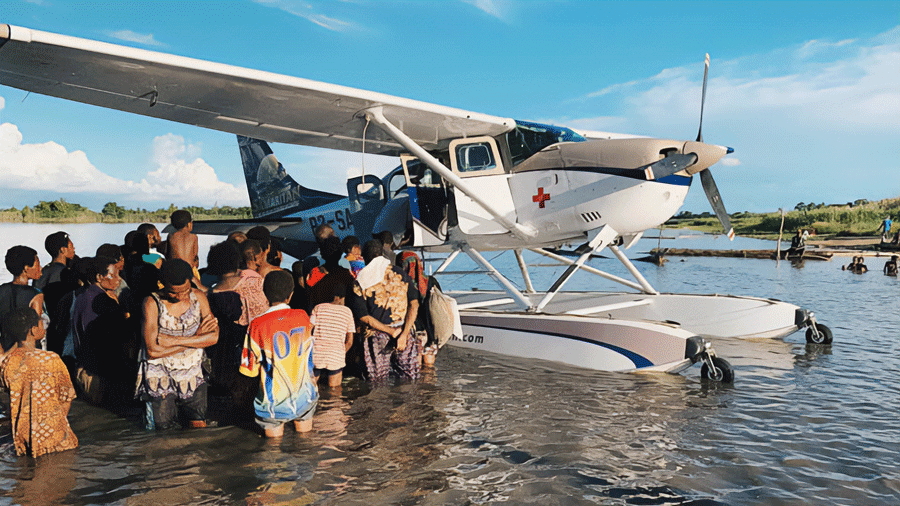
Papua New Guinea
Global Humanitarian Network Partner:
Samaritan Aviation
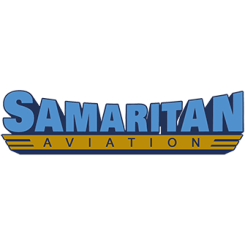
Samaritan Aviation is a nonprofit humanitarian aid organization that provides vital services to remote regions in Papua New Guinea (PNG). The organization’s work is particularly critical given that the region served is surrounded by dense jungle, with no access to roads or emergency medical services.
Samaritan Aviation’s services include emergency evacuation flights, medicine delivery and community health programs — all of which are aimed at improving the health and well-being of the roughly 220,000 people they serve. The organization’s emergency evacuation flights are particularly important, as they provide critically ill or injured patients with access to medical care that would otherwise be unavailable.
In addition to the services they provide, Samaritan Aviation also receives support from Wings of Hope. Wings of Hope provides fuel stipends, sources parts and supplies, assists with storage of the aircraft in the United States, provides support for a nurse training program and strategic planning support. The aim of this support is to ensure Samaritan Aviation’s ability to continue providing lifesaving services.
Samaritan Aviation’s work is a testament to the importance of providing access to health care and emergency services in remote regions of the world. Their efforts to provide emergency evacuation flights, medicine delivery and community health programs are improving the health and well-being of thousands of people who would otherwise be without access to these essential services.
Independent State of Papua New Guinea
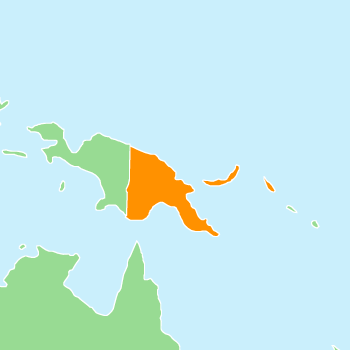
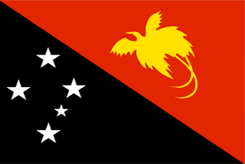
Capital: Port Moresby
Currency: Papua New Guinean Kina
Language: Tok Pisin
Landmarks: Kokoda Track, Port Moresby Nature Park, Mount Wilhelm
Geography:
Papua New Guinea is located in the southwestern Pacific Ocean, occupying the eastern half of the island of New Guinea, as well as numerous offshore islands. To the west, Papua New Guinea shares a border with Indonesia. To the north, it is bounded by the Pacific Ocean. The country also shares maritime borders with Australia to the south.
Papua New Guinea’s geography is characterized by rugged mountain ranges, dense rainforests, and extensive coastline. The central part of the island is dominated by the rugged Central Highlands, which are home to some of the tallest peaks in Oceania. The coastline is dotted with numerous islands, coral reefs, and mangrove swamps. Additionally, Papua New Guinea lies along the Pacific Ring of Fire, making it prone to volcanic eruptions and earthquakes.
Located in the southwestern Pacific Ocean, PNG is one of the oldest continuous cultures on the planet, with human settlements dating back to about 50,000-60,000 years ago. PNG has incredible ethnic and linguistic diversity. The Dutch navigator, Willem Janszoon, made the first known European contact with the island in 1606, after which various European powers such as the Germans and the British explored and claimed different parts of the island. PNG was officially divided between Britain and Germany in 1884, with the northern part becoming a British colony and the southern part becoming a German colony. After World War I, PNG came under Australian control and remained so until it gained independence in 1975. Despite facing challenges such as political instability, lack of infrastructure and economic development, and tribal divisions, PNG has made significant progress in recent years. Its economy, which largely depends on agriculture and forestry, is gradually improving as the government works to develop the country’s resources and improve infrastructure. PNG remains a colorful and diverse country with a unique cultural heritage.
The health care situation in PNG faces significant challenges. Difficult terrain and a lack of road infrastructure and transport contribute to the prohibitive cost of delivering services, and hinder patient referrals and supervisory visits. PNG has a shortage of medical personnel and facilities, with many people having to travel long distances to access basic health care services. Health care infrastructure is inadequate, with limited resources for health care delivery and infrastructure development. Essential medicines and medical equipment are often in short supply.
The provinces with the highest levels of early childhood mortality also have low levels of immunization coverage. National immunization rates have declined to as low as 43% for measles vaccination and 52% for the third dose of the pentavalent vaccine. The burden of disease in PNG is largely dominated by communicable diseases such as pneumonia, tuberculosis (TB), malaria and diarrheal diseases, but the prevalence of noncommunicable diseases is rapidly increasing. According to the Joint United Nations Program on HIV/AIDS report for 2012, HIV infections in PNG have decreased by more than 25% since 2001. HIV prevalence has remained below 1% (WHO 2018).
In efforts to strengthen the health care system, Samaritan Aviation provides medical evacuation and health care services to the East Sepik region of Papua New Guinea. The organization operates a floatplane that can reach isolated communities, providing emergency medical transport, and delivering medical supplies and personnel. Samaritan Aviation also partners with local health care providers and government agencies to improve health care access and infrastructure in remote areas.
Samaritan Aviation’s work has been crucial in addressing the health care needs of PNG’s remote communities, where traditional modes of transportation are often unreliable or non-existent. The organization’s medical evacuation services have saved countless lives, and its efforts to improve health care infrastructure and access have helped to reduce the burden of disease and improve health outcomes in remote areas.
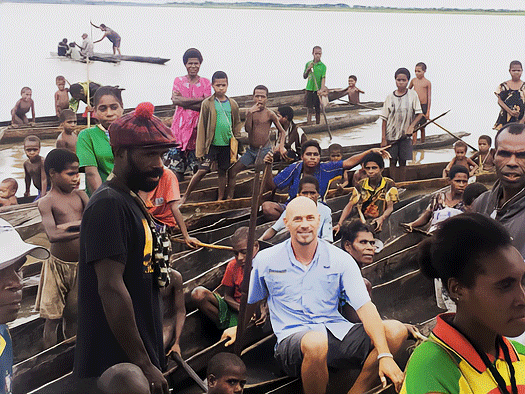
(Per Capita)
Papua New Guinea
Worldwide
Disease (by percentage %)
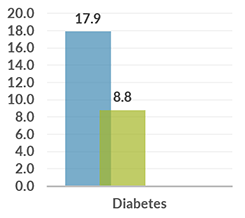
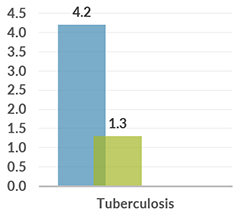
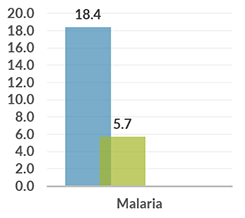
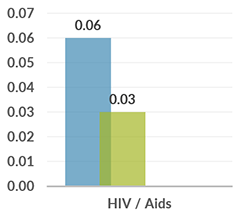
The number of people suffering from diabetes refers only to inhabitants aged between 20 and 79 years.
Child Vaccine (by percentage %)
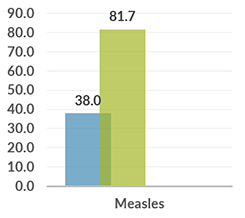
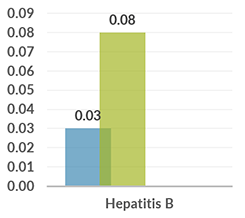
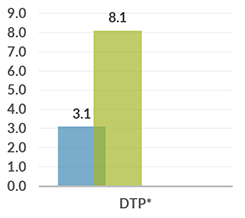
Oscar
It was early one morning, and Oscar was getting ready for his day as a high school teacher in Pagwi. On his walk to the water well for his morning shower, he was bitten by a highly poisonous death adder snake. Less than an hour later, Oscar began to feel dizzy, so he decided to go to the local health center. When he arrived, the effect of the poison was taking hold, and Oscar was unable to speak properly or swallow his saliva. He soon began to fall in and out of consciousness.
The nurses on site called Samaritan Aviation and began to transport Oscar down to the runway. Once our team landed, they put Oscar on the stretcher inside the plane and took off for Boram hospital.
During the flight, Oscar felt like he was beginning to die. “That’s what I was feeling”, he said, “that I wanted to die”. After arriving at the Wewak airport, we transferred Oscar into an ambulance and took him to the hospital. He was near death when he was admitted, and we weren’t sure he was going to make it.
After receiving anti-venom, Oscar began to regain consciousness. Within just a few days he had made a full recovery!
Oscar views this story as an interesting testimony and lives his life with joy. He was able to return home after a few days and resume teaching at the high school.
“I realized I was dead, but now I am alive… Thank you to Samaritan Aviation for your support, and to those who continue to support Samaritan Aviation… thank you. May God bless you all and what you are doing.” – Oscar
Saving Babies
Samaritan Aviation recently helped save the lives of six Sepik babies in just 24 hours. First-time mother Bilasa had given birth to premature twins, who grew increasingly weak with each passing day. When the nurse from the district health center of Angoram called for help, Samaritan Aviation transported the babies to the hospital but soon received another call for help from Samban village. A woman named Paulina had delivered one baby but was unable to deliver the twin. The pilots quickly returned to pick up Paulina and her transverse twin baby boy, attended by Dr. Angela Seginami, who expertly repositioned and delivered the baby. Thanks to Samaritan Aviation’s quick response and medical expertise, Paulina and her healthy twin sons returned home, and the premature twins from Angoram are slowly gaining weight and feeding without the assurance of a feeding tube. In addition, at a local prenatal clinic, an expectant mother was referred to Boram Hospital for a cesarean after an ultrasound revealed she was expecting twins, one of which was breech and one transverse. The twin brothers were successfully delivered and treated for infections caused by fetal distress, returning home with their mother a week later.
Located in the southwestern Pacific Ocean, PNG is one of the oldest continuous cultures on the planet, with human settlements dating back to about 50,000-60,000 years ago. PNG has incredible ethnic and linguistic diversity due to its harsh geography that isolated many groups. The Dutch navigator, Willem Janszoon, made the first known European contact with the island in 1606, after which various European powers such as the Germans and the British explored and claimed different parts of the island. PNG was officially divided between Britain and Germany in 1884, with the northern part becoming a British colony and the southern part becoming a German colony. After World War I, PNG came under Australian control and remained so until it gained independence in 1975. Despite facing challenges such as political instability, lack of infrastructure and economic development, and tribal and cultural divisions, PNG has made significant progress in recent years. Its economy, which largely depends on agriculture and forestry, is gradually improving as the government works to develop the country’s resources and improve infrastructure. Despite internal conflicts, PNG remains a colorful and diverse country with a unique cultural heritage.
The health care situation in PNG faces significant challenges. Difficult terrain and a lack of road infrastructure and transport contribute to the prohibitive cost of delivering services, and hinder patient referrals and supervisory visits. PNG has a shortage of medical personnel and facilities, with many people having to travel long distances to access basic health care services. Health care infrastructure is inadequate, with limited resources for health care delivery and infrastructure development. Essential medicines and medical equipment are often in short supply.
The provinces with the highest levels of early childhood mortality also have low levels of immunization coverage. National immunization rates have declined to as low as 43% for measles vaccination and 52% for the third dose of the pentavalent vaccine. The burden of disease in PNG is largely dominated by communicable diseases such as pneumonia, tuberculosis (TB), malaria and diarrheal diseases, but the prevalence of noncommunicable diseases is rapidly increasing. According to the Joint United Nations Program on HIV/AIDS report for 2012, HIV infections in PNG have decreased by more than 25% since 2001. HIV prevalence has remained below 1% (WHO 2018).
In efforts to strengthen the health care system, Samaritan Aviation provides medical evacuation and health care services to the East Sepik region of Papua New Guinea. The organization operates a floatplane that can reach isolated communities, providing emergency medical transport, and delivering medical supplies and personnel. Samaritan Aviation also partners with local health care providers and government agencies to improve health care access and infrastructure in remote areas.
Samaritan Aviation’s work has been crucial in addressing the health care needs of PNG’s remote communities, where traditional modes of transportation are often unreliable or non-existent. The organization’s medical evacuation services have saved countless lives, and its efforts to improve health care infrastructure and access have helped to reduce the burden of disease and improve health outcomes in remote areas.

(Per Capita)
Papua New Guinea
Worldwide
Disease (by percentage %)




The number of people suffering from diabetes refers only to inhabitants aged between 20 and 79 years.
Child Vaccine (by percentage %)



Oscar
It was early one morning, and Oscar was getting ready for his day as a high school teacher in Pagwi. On his walk to the water well for his morning shower, he was bitten by a highly poisonous death adder snake. Less than an hour later, Oscar began to feel dizzy, so he decided to go to the local health center. When he arrived, the effect of the poison was taking hold, and Oscar was unable to speak properly or swallow his saliva. He soon began to fall in and out of consciousness.
The nurses on site called Samaritan Aviation and began to transport Oscar down to the runway. Once our team landed, they put Oscar on the stretcher inside the plane and took off for Boram hospital.
During the flight, Oscar felt like he was beginning to die. “That’s what I was feeling”, he said, “that I wanted to die”. After arriving at the Wewak airport, we transferred Oscar into an ambulance and took him to the hospital. He was near death when he was admitted, and we weren’t sure he was going to make it.
After receiving anti-venom, Oscar began to regain consciousness. Within just a few days he had made a full recovery!
Oscar views this story as an interesting testimony and lives his life with joy. He was able to return home after a few days and resume teaching at the high school.
“I realized I was dead, but now I am alive… Thank you to Samaritan Aviation for your support, and to those who continue to support Samaritan Aviation… thank you. May God bless you all and what you are doing.” – Oscar
Saving Babies
Samaritan Aviation recently helped save the lives of six Sepik babies in just 24 hours. First-time mother Bilasa had given birth to premature twins, who grew increasingly weak with each passing day. When the nurse from the district health center of Angoram called for help, Samaritan Aviation transported the babies to the hospital but soon received another call for help from Samban village. A woman named Paulina had delivered one baby but was unable to deliver the twin. The pilots quickly returned to pick up Paulina and her transverse twin baby boy, attended by Dr. Angela Seginami, who expertly repositioned and delivered the baby. Thanks to Samaritan Aviation’s quick response and medical expertise, Paulina and her healthy twin sons returned home, and the premature twins from Angoram are slowly gaining weight and feeding without the assurance of a feeding tube. In addition, at a local prenatal clinic, an expectant mother was referred to Boram Hospital for a cesarean after an ultrasound revealed she was expecting twins, one of which was breech and one transverse. The twin brothers were successfully delivered and treated for infections caused by fetal distress, returning home with their mother a week later.
Saving Lives from the Skies:
Samaritan Aviation's Lifesaving Work in Papua New Guinea
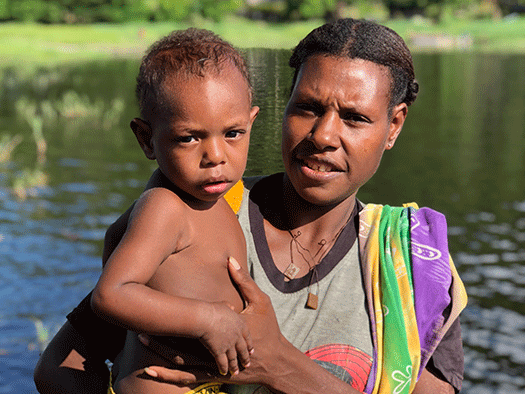
Samaritan Aviation is a team of dedicated and compassionate individuals who are committed to making a difference in the lives of those who need it most. Through their lifesaving work, they provide essential medical care to the people of Papua New Guinea’s remote communities, often in areas that are inaccessible by road. The team is made up of highly skilled pilots and medical professionals who are driven by a deep sense of purpose and a desire to serve others. With a focus on building strong relationships with the communities they serve, Samaritan Aviation can provide personalized care that truly makes a difference.






